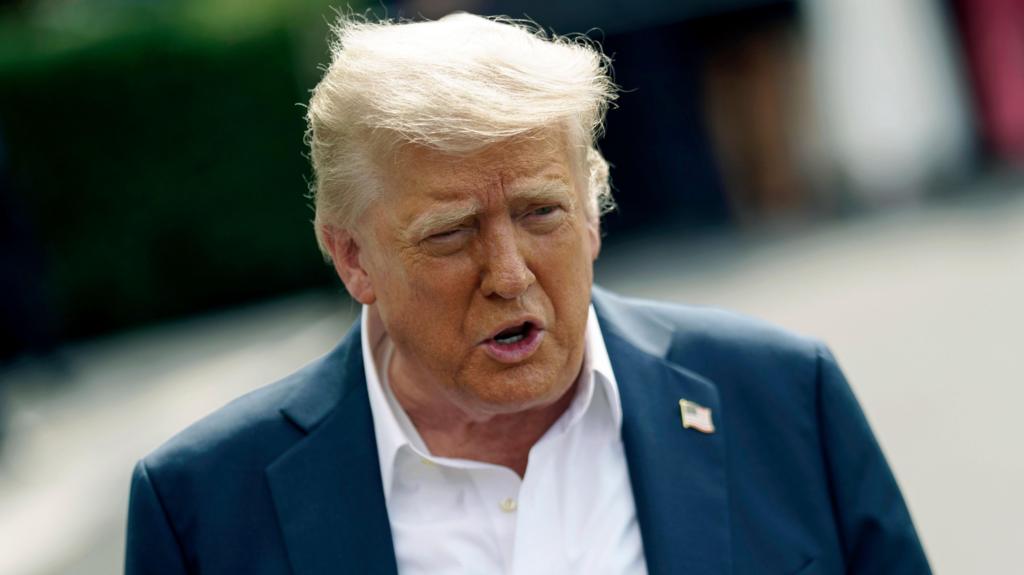“`html
Nigel Farage has described as “shoddy” the fact that Donald Trump will not have the opportunity to address Parliament during his upcoming state visit, his second as president.
The criticism follows the announcement that the US president’s three-day visit will commence on September 17, the day after the House of Commons adjourns for the party conference season.
The Reform UK leader characterized the timing of the trip as “cowardly,” suggesting it reflects the Labour government’s preference for closer ties with Europe.
Downing Street has refuted claims that the visit was intentionally scheduled during the recess, directing inquiries about the timing to Buckingham Palace.
However, state visits are typically planned in collaboration with the government.
Last week, French President Emmanuel Macron addressed both Houses of Parliament during his own three-day state visit to the UK.
Such addresses are not guaranteed; only approximately one in four state visits since 1952 have included a formal address to Parliament.
Since World War Two, three US presidents have addressed Parliament: Ronald Reagan in 1982, Bill Clinton in 1995, and Barack Obama in 2011.
Following Mr. Trump’s initial election victory in 2017, then-Commons Speaker John Bercow stated his strong opposition to the US president delivering an address.
In 2019, over 100 MPs signed a parliamentary motion accusing Mr. Trump of “misogynism, racism, and xenophobia,” urging the then-Conservative government not to extend a state visit invitation.
The motion was proposed by Stephen Doughty, now a Foreign Office minister, and was co-signed by current Foreign Secretary David Lammy.
During his 2019 state visit, Mr. Trump did not address Parliament.
In April of this year, Labour MP Kate Osborne reportedly wrote to Commons Speaker Lindsay Hoyle requesting that he prevent Mr. Trump from addressing Parliament.
A parliamentary motion advocating the same stance was also signed by some MPs, primarily from the Labour and Green parties.
Speaking to the BBC, Mr. Farage, a prominent British supporter of the US president, acknowledged that a Trump address to MPs and peers would be controversial, noting that “anything to do with Donald Trump results in a row.”
However, he asserted that Mr. Trump is “more pro-British” than Mr. Macron and emphasized the importance of the UK’s alliance with the United States for trade and the NATO military alliance.
Contrasting the situation with the “full ceremonial visit” given to President Macron, he added: “This just tells you what this government’s real priorities are.”
“It’s European Union above everything else, including America – who of course are not only our most important ally, but without whom we are defenceless. So I think the whole thing is shoddy.”
In a social media post, he stated: “Parliament should be recalled and Trump must be given the opportunity to address both Houses.”
The Liberal Democrats have urged the government to invite Canadian Prime Minister Mark Carney to address Parliament shortly before Trump’s state visit.
Leader Sir Ed Davey said the move would “send an important signal that Britain stands shoulder-to-shoulder with Canada against Trump’s chaotic trade war.”
The government does not intend to alter the parliamentary schedule to accommodate a Trump address to MPs and peers.
Sir Keir Starmer’s official spokesperson told reporters: “Questions on the timings and dates are for the Palace. They’ve obviously agreed dates with the President.”
“I would firmly steer you away from the idea the timings of a visit are anything to do with Parliament recess dates,” he added.
Meanwhile, Downing Street has confirmed that Prime Minister Sir Keir Starmer will meet Trump when the US president visits his golf resort at Menie in Aberdeenshire later this month.
No 10 said Sir Keir had accepted an invitation to meet during the “private” trip to Scotland.
Invitations for state visits are formally extended by the monarch but on the advice of government, typically coordinated through the Foreign, Commonwealth and Development Office (FCDO).
Dates are determined jointly by the government, the Palace, and visiting dignitaries.
The House of Lords will be in session during Trump’s visit, but longstanding parliamentary rules stipulate that a joint address to both houses can only occur when both are in session.
The final decision rests with the Speakers of the Commons and Lords, although in practice, any speeches are agreed upon with the government of the day.
The Royal Family has confirmed that Trump’s visit will be centered at Windsor Castle, as Buckingham Palace is currently undergoing renovations.
The ceremonial aspects of the visit, including a state banquet and Guard of Honour, are expected to proceed as planned.
Sign up for our Politics Essential newsletter to stay informed about the inner workings of Westminster and beyond.
The US president is expected to arrive at his Aberdeenshire golf resort later this month.
The US president will be accompanied by his wife, Melania, when he visits the UK from 17-19 September.
The Senate will decide soon on whether to claw back $1.1bn (£800m) from the Corporation for Public Broadcasting.
Hungarian Prime Minister Viktor Orban finds his power under threat, but not in the way one might expect.
The president hits out at critics accusing Bondi of withholding information about the sex offender.
“`

